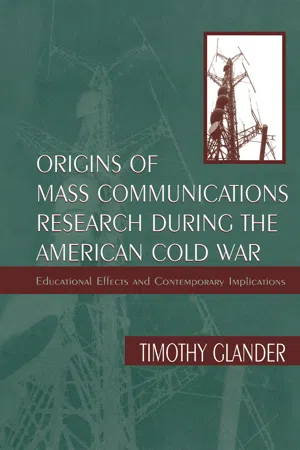
Origins of Mass Communications Research During the American Cold War
Educational Effects and Contemporary Implications
- 256 pages
- English
- ePUB (mobile friendly)
- Available on iOS & Android
Origins of Mass Communications Research During the American Cold War
Educational Effects and Contemporary Implications
About This Book
In this critical examination of the beginnings of mass communications research in the United States, written from the perspective of an educational historian, Timothy Glander uses archival materials that have not been widely studied to document, contextualize, and interpret the dominant expressions of this field during the time in which it became rooted in American academic life, and tries to give articulation to the larger historical forces that gave the field its fundamental purposes. By mid-century, mass communications researchers had become recognized as experts in describing the effects of the mass media on learning and other social behavior. However, the conditions that promoted and sustained their authority as experts have not been adequately explored. This study analyzes the ideological and historical forces giving rise to, and shaping, their research. Until this study, the history of communications research has been written almost entirely from within the field of communications studies and, as a result, has tended to refrain from asking troubling foundational questions about the origins of the field or to entertain how its emergence shaped educational discourse during the post-World War II period. By examining the intersection between the individual biographies of key leaders in the communications field (Wilbur Schramm, Paul Lazarsfeld, Bernard Berelson, Hadley Cantril, Stuart Dodd, and others) and the larger historical context in which they lived and worked, this book aims to tell part of the story of how the field of communications became divorced from the field of education. The book also examines the work of significant voices on the rise of mass communications study (including C. Wright Mills, William W. Biddle, Paul Goodman, and others) who theorized about the emergence of a mass society. It concludes with a discussion of the contemporary relevance of the theory of a mass society to educational thought and practice.
Frequently asked questions
Information
Table of contents
- Sociocultural, Political, and Historical Studies in Education
- Contents
- Preface
- CHAPTER ONE Education and Propaganda: The Propaganda Debate Between the Wars
- CHAPTER TWO Communications Research Comes of Age
- CHAPTER THREE The Social Ideas of American Mass Communications Experts
- CHAPTER FOUR Paul F.Lazarsfeld and the Bureau of Applied Social Research
- CHAPTER FIVE Wilbur Schramm and the Founding of Communication Study
- CHAPTER SIX The Universe of Discourse in Which We Grew Up
- CHAPTER SEVEN Conclusion
- Bibliography
- Index